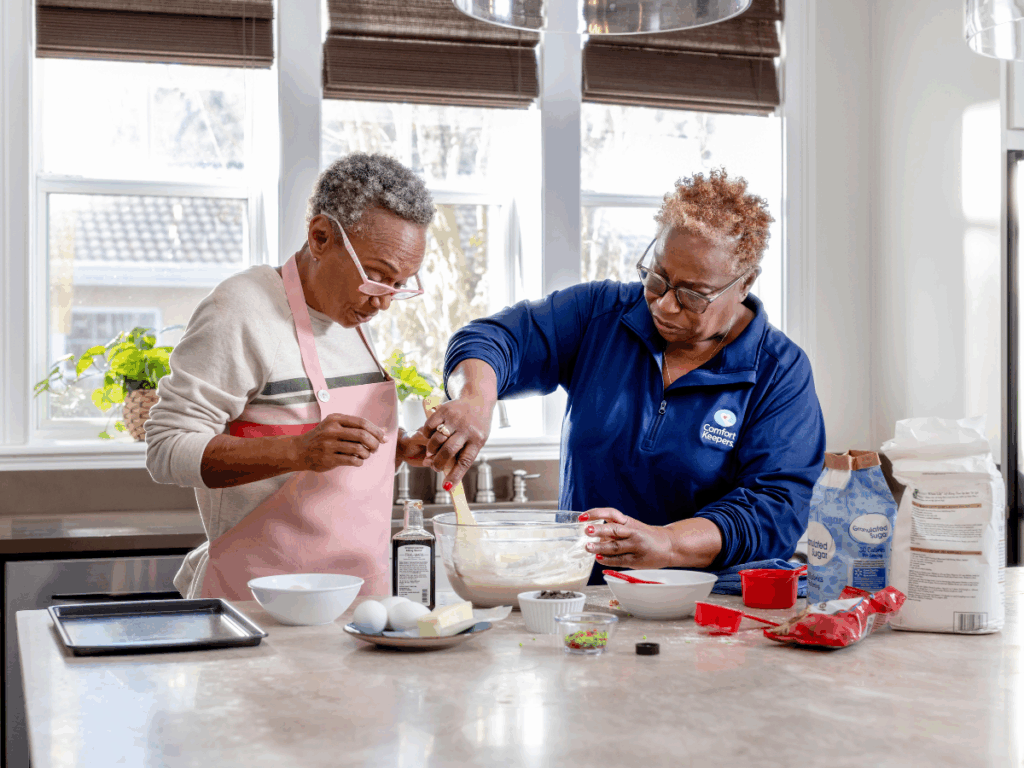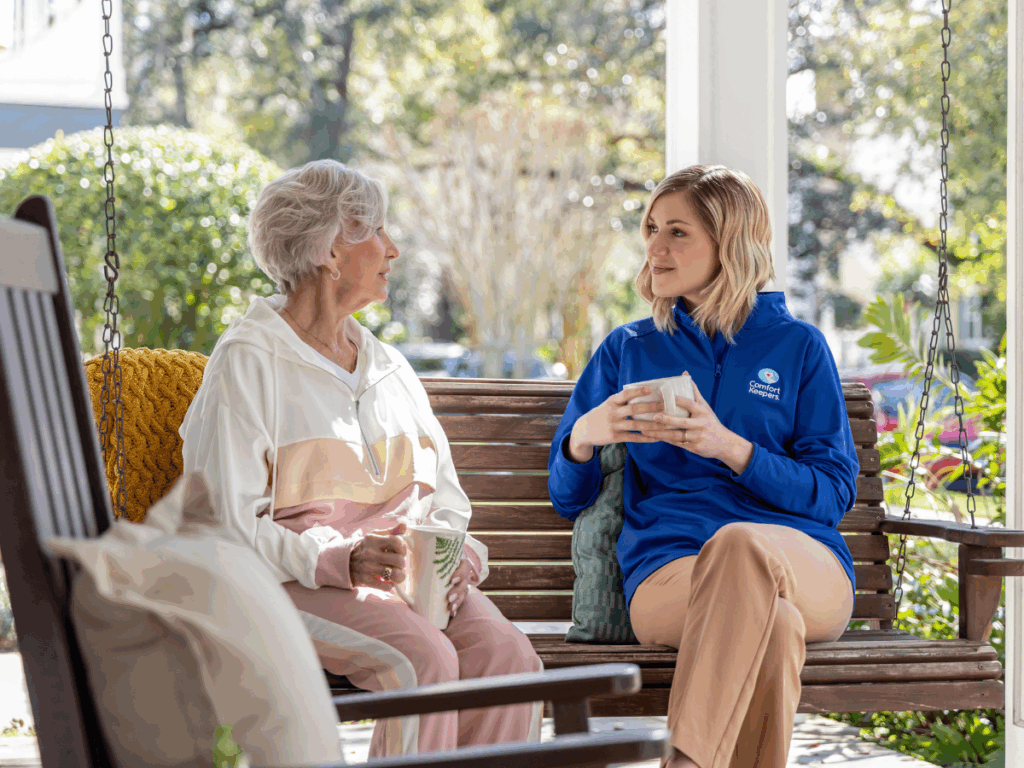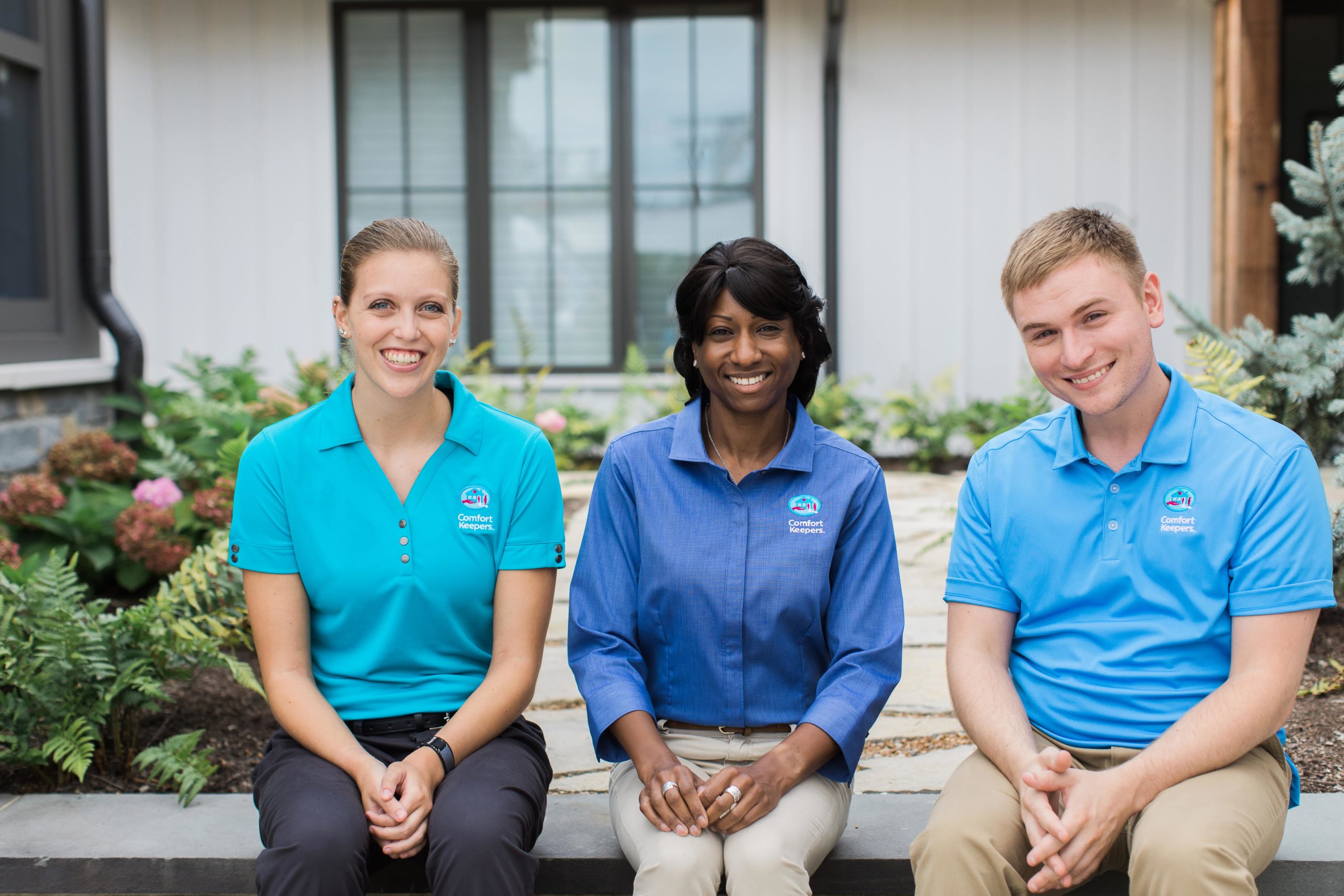Preventing Unintentional Weight Loss in Seniors: Nurturing Health with Every Bite
Senior Nutrition | October 14, 2025
It’s a scenario many families eventually face: you notice your senior loved one seems a little thinner, their clothes fit differently, or their appetite has waned. It’s easy to dismiss this as “just part of getting older,” but what if it’s a silent signal that their health is at risk? The truth is, significant, unintentional weight loss is never a normal part of aging, and it’s a critical sign that requires attention.
At Comfort Keepers Regina, we understand the concerns that arise when a loved one starts losing weight without trying. We believe that knowledge is the first step towards empowering families and seniors to live their fullest, healthiest lives. This guide aims to shed light on why unintentional weight loss happens in seniors and, more importantly, how nutrient-dense, high-calorie meal ideas can be a powerful tool in combating it, ensuring vitality and well-being.

The Silent Threat: Understanding Unintentional Weight Loss
When we talk about unintentional weight loss, we’re referring to a noticeable decrease in body weight that isn’t due to deliberate dieting or increased exercise. For seniors, this can be a serious issue, often leading to a cascade of health problems.
More Than Just “Getting Older”
While it might seem like a natural progression, experts, including those at the American Academy of Family Physicians, emphasize that significant unintentional weight loss is a medical concern, not just an age-related inevitability. A loss of 5% of body weight in one month, or 10% over six to twelve months, is generally considered concerning and warrants a doctor’s visit.
Why is this so dangerous? Because it’s often a red flag for underlying health issues, and it can significantly increase the risk of:
- Frailty: Leading to weakness, reduced mobility, and a higher risk of falls.
- Weakened Immune System: Making seniors more susceptible to infections and slower to recover from illness.
- Slower Healing: Wounds and injuries may take much longer to heal.
- Reduced Quality of Life: Less energy, diminished social engagement, and an overall decline in well-being.
The Hidden Causes: Why Seniors Lose Weight (It’s Complex!)
Understanding why seniors might be losing weight is crucial. It’s rarely a single factor but often a combination of interconnected challenges. Think of it like a puzzle, where each piece contributes to the overall picture:
- Medical Conditions: Chronic diseases (heart failure, kidney disease), undiagnosed illnesses (even early-stage dementia), dental problems making chewing difficult, or gastrointestinal issues can all impact appetite and nutrient absorption.
- Medication Side Effects: Many common prescriptions can reduce appetite, alter taste, or cause nausea. It’s important to review all medications with a doctor.
- Psychological Factors: Depression, anxiety, and grief are powerful appetite suppressants. Social isolation can also lead to a lack of motivation to prepare or eat meals, turning mealtimes into a lonely chore rather than an enjoyable activity. A Place for Mom highlights the significant impact of social and behavioral factors.
- Physical Limitations: Arthritis or reduced mobility can make grocery shopping, cooking, and even carrying food to the table challenging.
- Sensory Changes: As we age, our sense of taste and smell can diminish, making food less appealing and bland.
- Financial Constraints: Limited income can restrict access to nutritious, high-quality foods.
Recognizing these varied causes is the first step in addressing the issue with compassion and practical solutions. It’s about more than just food; it’s about understanding the whole person and their unique circumstances, a philosophy deeply ingrained in Comfort Keepers’ approach to personalized care.
Your Plate as a Powerful Tool: High-Calorie, Nutrient-Dense Strategies
Once you understand the “why,” the next step is focusing on the “how.” The goal isn’t just to make seniors eat more; it’s about helping them eat smarter by choosing foods that pack a powerful nutritional punch in smaller, more manageable portions.
What Does “High-Calorie, Nutrient-Dense” Really Mean?
Imagine a small, perfectly wrapped gift. That’s what we’re aiming for with food: every bite should deliver a concentrated dose of essential calories, proteins, vitamins, and minerals. This isn’t about eating empty calories like sugary drinks or processed snacks, but rather maximizing the nutritional value of every single ingredient.
The shift in mindset is crucial: instead of thinking “eat less,” we’re thinking “eat more efficiently.”
General Strategies for Boosting Intake
Here are some fundamental strategies to help seniors increase their caloric and nutrient intake:
- Small, Frequent Meals: Instead of three large meals, offer 5-6 smaller meals or snacks throughout the day. This is often less daunting for a reduced appetite.
- Fortification is Your Friend: This is a game-changer! Discreetly add extra calories and nutrients to existing favorite foods. Think:
- A tablespoon of olive oil in soups or mashed potatoes.
- Extra butter or margarine on toast, vegetables, or rice.
- Full-fat dairy products like whole milk, heavy cream, or cheese in sauces, scrambled eggs, or smoothies.
- Nut butters (peanut, almond, cashew) in oatmeal, on fruit, or in shakes.
- Protein powder (unflavored) mixed into drinks, yogurt, or soft foods.
- Make it Appealing: Presentation matters! Bright colors, varied textures, and pleasant aromas can stimulate appetite. Use smaller plates to make portions look more substantial and less overwhelming.
- Prioritize Calories at the Start of the Meal: Offer the most calorie-dense foods first when appetite is strongest.
- Hydration, But Strategically: Encourage fluids between meals rather than during, as drinking too much with meals can fill up the stomach quickly, leaving less room for food.
- Create a Positive Mealtime Environment: Eating should be an enjoyable experience. Ensure a comfortable, calm setting. If possible, eat together to foster social connection, which can naturally stimulate appetite and engagement. This aligns perfectly with Comfort Keepers’ Interactive Caregiving™ approach, which focuses on actively engaging clients in their care and daily life.
Delicious Ideas: High-Calorie, Nutrient-Dense Meals for Seniors
Now, let’s get practical! Here are some concrete meal ideas that are both high in calories and rich in nutrients, while also being generally easy for seniors to eat. AgingCare.com offers valuable insights into high-calorie food options, and we build on that with specific meal suggestions.
Breakfast Boosts
Breakfast is an excellent opportunity to start the day with a caloric and nutrient kick.
- Super Smoothies: Blend whole milk or full-fat yogurt with a banana, a scoop of nut butter, a handful of spinach (you won’t taste it!), and a tablespoon of flax or chia seeds. Add a scoop of protein powder for an extra boost.
- Fortified Oatmeal: Cook oatmeal with whole milk instead of water. Stir in cream, butter, dried fruit, chopped nuts, and a spoonful of brown sugar or maple syrup.
- Creamy Scrambled Eggs: Scramble eggs with a generous amount of cheese, a splash of whole milk, and butter. Serve with a slice of avocado toast (on whole-grain bread) with extra butter.
Hearty Lunches
Lunch can be a challenge, but these ideas offer comforting and nutritious options.
- Creamy Soups: Opt for cream-based soups (e.g., cream of mushroom, potato, broccoli cheddar) and enrich them with heavy cream, shredded cheese, or puréed cooked chicken or beans for extra protein.
- Nut Butter Power Sandwiches: Spread peanut or almond butter generously on soft, whole-grain bread. Add a layer of banana slices or a sprinkle of flax seeds. Cut into small, manageable triangles.
- Mini Quiches/Frittatas: These are packed with protein from eggs and can include cheese, cream, and finely diced vegetables. Easy to eat and can be made in advance.
Comforting Dinners
Focus on tender, flavorful meals that are easy to digest.
- Slow-Cooker Stews: Prepare stews with tender cuts of meat (beef, chicken), potatoes, and root vegetables. The slow-cooking process makes the meat incredibly soft. Thicken with a little cream or cornstarch slurry.
- Creamy Pasta Dishes: Use full-fat milk or cream in sauces for pasta. Add ground meat, finely chopped vegetables, and plenty of cheese. Whole wheat pasta offers more nutrients.
- Baked Fish with Rich Sauces: Salmon, cod, or tilapia are excellent sources of healthy fats and protein. Serve with a creamy dill sauce, a buttery lemon sauce, or a pesto drizzle. Pair with mashed potatoes (fortified with butter and cream) or soft, roasted sweet potatoes.
Smart Snacking
Snacks are ideal for adding extra calories without overwhelming a delicate appetite.
- Full-Fat Yogurt or Cottage Cheese: Serve with fruit, a drizzle of honey, or a sprinkle of granola.
- Cheese and Crackers: Choose soft, easy-to-chew crackers and full-fat cheese slices.
- Avocado Slices: A fantastic source of healthy fats and calories, easy to eat on their own or with a sprinkle of salt.
- Hard-Boiled Eggs: A portable protein powerhouse.
- Dried Fruits and Nuts: (If chewing is not an issue) offer small handfuls of raisins, apricots, or almonds.

Adapting for Specific Challenges
Seniors often face unique eating challenges. Here’s how to adapt these meal ideas:
Dysphagia (Difficulty Swallowing) & Chewing Issues:
- Texture Modification: Focus on puréed, soft, or minced textures. Smoothies, cream soups, mashed potatoes, and soft-cooked vegetables are excellent.
- Thickeners: Use food thickeners for liquids to make them safer to swallow.
- Moisture: Ensure all foods are moist; avoid dry, crumbly items.
Dementia & Cognitive Impairments:
- Finger Foods: Offer nutrient-dense items that can be eaten without utensils, such as cheese cubes, small sandwiches, soft-cooked chicken pieces, or fruit slices.
- Familiar Foods: Stick to comforting, familiar foods to reduce anxiety and encourage intake.
- Simplify the Plate: Avoid overwhelming the senior with too many options or a cluttered plate.
- Routine: Maintain consistent meal and snack times.
Taste Changes:
- Stronger Flavors: Experiment with herbs, spices, lemon juice, or small amounts of sauces to enhance flavor without adding excessive salt.
- Sweet/Sour/Savory Balance: Sometimes a combination of flavors can stimulate appetite.
Partnering for Health: When to Seek Professional Support
While dietary adjustments are incredibly powerful, they are just one piece of the puzzle. If you notice unintentional weight loss in a senior, the first and most crucial step is always to consult their doctor. A medical evaluation can identify underlying conditions, review medications, and rule out any serious causes.
Additionally, a registered dietitian can provide personalized advice tailored to specific health conditions (like diabetes or kidney disease) while still addressing weight loss.
At Comfort Keepers Regina, we work in close partnership with families and healthcare professionals. Our dedicated caregivers can assist with meal preparation, ensuring your loved one receives high-calorie, nutrient-dense foods that cater to their preferences and needs. From providing compassionate in-home care services like meal preparation and feeding assistance to offering specialized care for conditions like dementia, and even providing in-home nursing support for complex medical needs, we are here to support your family’s journey toward better health and well-being.
Frequently Asked Questions About Senior Weight Loss & Nutrition
Is some weight loss normal with aging?
No. While metabolism slows, significant, unintentional weight loss is not a normal part of healthy aging and should always be investigated by a doctor. It’s a sign that something else may be going on.
How much weight loss is concerning?
A loss of 5% of body weight in one month, or 10% over six to twelve months, is typically considered clinically significant and warrants medical attention. For example, for a 150-pound person, a 7.5-pound loss in a month would be concerning.
What if my loved one refuses to eat?
This can be incredibly frustrating. Try offering small, frequent portions of their favorite high-calorie, nutrient-dense foods. Make mealtimes pleasant and unhurried. Sometimes, a change of scenery, eating with company, or offering finger foods can help. Avoid pressuring them, as this can worsen the situation.
Can nutritional supplements replace food?
While oral nutritional supplements (like Boost or Ensure) can be helpful additions to a senior’s diet, they should not replace whole foods. A “food first” approach is generally recommended, as whole foods provide a broader spectrum of nutrients, fiber, and the enjoyment of eating. Supplements should be used as an adjunct, ideally under the guidance of a healthcare professional.
Are these high-calorie meals difficult to prepare for busy caregivers?
Many of these strategies focus on simple additions or modifications to existing recipes. Batch cooking (preparing larger quantities of meals at once) and utilizing convenient, nutrient-dense ingredients (like pre-chopped vegetables, canned beans, rotisserie chicken) can save significant time. The goal is to make healthy eating as easy and enjoyable as possible.
Taking the Next Step: Ensuring Well-being for Your Loved One
Unintentional weight loss in seniors is a complex issue, but it’s one we can address with awareness, empathy, and practical strategies. By understanding the causes, implementing nutrient-dense meal ideas, and knowing when to seek professional help, you can play a crucial role in preventing malnutrition and fostering a vibrant, independent life for your senior loved one.
At Comfort Keepers Regina, we are committed to providing the education and support families need. If you’re looking for assistance with meal preparation, personal care, or companionship to enhance your loved one’s quality of life, we invite you to learn more about how our compassionate caregivers can help. We believe every senior deserves to thrive, and we’re here to help make that a reality, one nourishing meal at a time.
The Best, Expert Senior Home Care in Regina, Saskatchewan is Comfort Keepers®
At Comfort Keepers®, we provide personalized, compassionate in-home care services for seniors in Regina, Moose Jaw, Weyburn, Estevan, Swift Current, Yorkton and White City.
The team at Comfort Keepers Regina is proud to provide home care that keeps seniors safe. We support Saskatchewan families each year with home care services for seniors—helping loved ones remain happy, and independent in the homes they love.
Home is The Best Place to Be for Senior Care
Providing home care can be very draining and taxing on family caretakers. That’s where we come in. With in-home assisted living as a lifestyle choice seniors can start a new, fresh take on daily living while remaining in the comfort and familiarity of home.
Comfort Keepers® Regina offers professional, flexible care solutions that lighten the load for families and give everyone peace of mind—knowing their loved one is in good hands.
We offer a range of services that include senior companionship and personal care services, light housekeeping and meal preparation. The team also provides specialized services for those with dementia and end of life care needs.
Comfort Keepers® Regina Can Help with Companion Care and Interactive Caregiving™
Our trained caregivers, or Comfort Keepers, help provide our elderly clients with personal home care to help maintain the highest possible quality of life. Caregivers deliver Interactive Caregiving™, a system of care that addresses safety, nutrition, mind, body, and activities of daily living (ADLs).
Interactive Caregiving™ is an opportunity to interact one-to-one with a senior. This model of elderly care helps increase seniors’ sense of well-being and independence by focusing on Senior Mind, Senior Body, Senior Nutrition, and Senior Safety.
It is through our Interactive Caregiving™ approach and the Nourish Senior Life Program® that Comfort Keepers of Regina provides top-notch home health care for seniors and the elderly.
Our partnership with the Canadian National Institute for the Blind provides specially trained care assistants who help the elderly with vision loss, helping seniors maintain their independence and remain in their homes.
Comfort Keepers® Regina Provides Home Care and a Wide Range of In-Home Care Services for Seniors.
Are you looking for reliable home care in Regina and the surrounding region? Learn more about our unique service, which offers personal care, companionship care, palliative, and end-of-life care in Regina, Moose Jaw, Weyburn, Estevan, Swift Current, Yorkton and White City. Contact the Comfort Keepers® Regina office today, our professional staff will be happy to explain our customizable in-home care options and to schedule a free in-home consultation.
Individualized Home Care Options
Long-Term Home Care, 24 Hour Home Care & Short Term Care Options Customized for You






